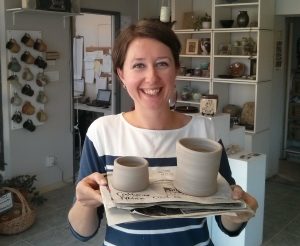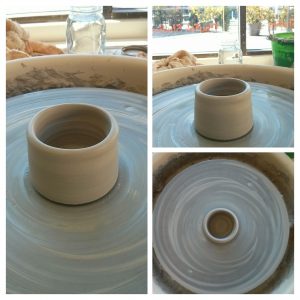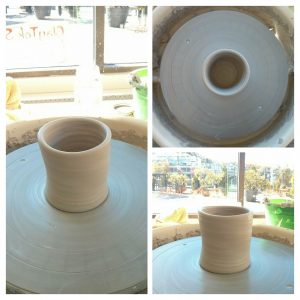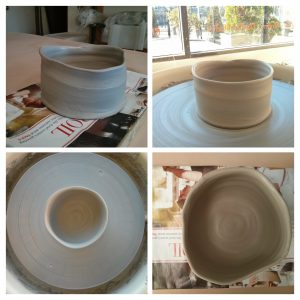A few weeks ago I headed to Southern Ontario to meet with colleagues at five different universities. While discussing the 2nd edition of my textbook, I learned about the statistics and research methods courses for psychology majors at the University of Guelph and Wilfred Laurier. I learned how psychology fits into degrees at Renison University College (within Waterloo) and Huron University College (within Western), and how the curriculum has changed since I was an undergraduate student at Waterloo. Spending a day at McMaster was incredible! I learned about their introductory psychology machine (check them out on Twitter ) and amazing Honours program. I also learned how different institutions incorporate (or don’t) teaching focused faculty members, which will be useful for the SoEL research project I’m working on as part of this certificate program. Many thanks to all my hosts!
What I did *not* do during that week was go to my pottery class. Turns out we were learning how to make bowls. That may sound easy after all the cylinders I’ve been making, but don’t fool yourself. Nothing is easy in pottery (at least not right away). I went in for an extra visit to try to make a bowl and the result seemed reasonably bowl-shaped.
I smudged the rim a bit after these photos were taken. Bummer. I also notice some of my errors: for some reason I wasn’t pulling up enough clay from the outside, and somehow managed to create an edge instead of a solid rim because I was hanging on to the clay too long rather than stopping and compressing. But at least I had something bowl-shaped. Unfortunately, timing was not my friend in this case.
The reason why bowls have a curved outside is because you scrape off that part of the clay when your bowl reaches a particular type of firmness (called “leather hard” because it feels like leather or cheddar cheese). I saw the demonstration for how to finish the bottom of the bowl before I had a bowl of my own to practice with. By the time I had returned to this bowl, it was past the point of leather hard, now too firmly set to make any cuts. Sigh. I decided to fire it anyway. It will be an ugly half-bowl half-cylinder creature. I can use it to practice glazing techniques.
I must admit I’m losing some steam for pottery. Part of this is because I’ve been travelling and have now missed a couple of classes. Turns out it’s really difficult to learn how to do pottery without enough practice and without all the instruction possible. I’m having a harder and harder time remembering the steps and figuring out what I miss, I’m making ugly products, and the class is almost over anyway which further reduces my motivation to get closer to doing well at this art.
Do some of my students go through a spiral like this? I can imagine a parallel with a semester here: Starting out keen and ready to learn something entirely knew, hitting a few roadbumps, other required commitments dragging attention away, not building in enough time to work with the material, and before you know it the course is almost over and you’re so far behind it’s not all that fun anymore. Plus, for me anyway, I figure by now have the basics. I now know some of what I don’t know about this discipline, which makes me appreciate it more when I encounter it in everyday life. I also know I’m not going to go any farther in it anytime soon, if ever. Although I’m not going to become a potter, I value the lessons I’m learning about patience and being a novice, as well as the insight into motivation changes for a non-required class. And I’m going to have actual real tangible products to show what I learned. Note to self: Think more on that.

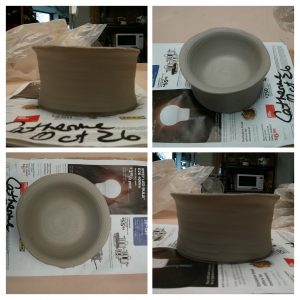
 Follow
Follow
